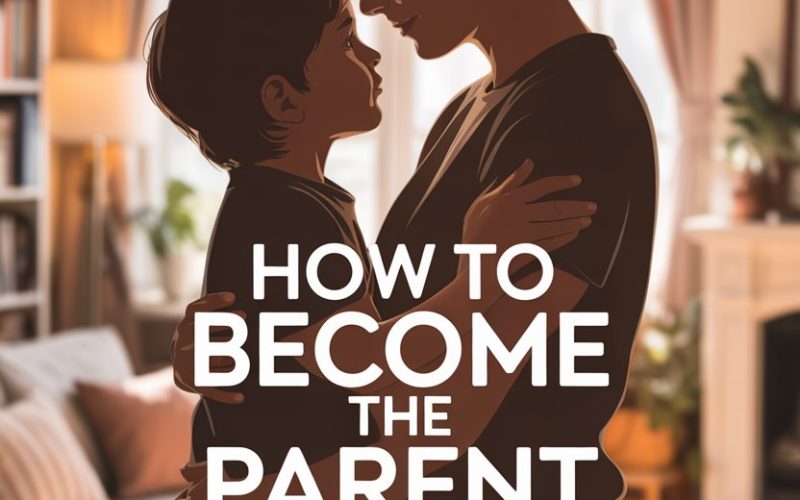If you’ve ever looked at your child in the middle of a supermarket meltdown and thought, “This is my circus, and that is definitely my monkey,” you’re in good company.
Parenting brings out the best, worst, and weirdest in all of us.
Every parent has those moments of reflection—between the requests for snacks and the heroic toy-rescue missions—when you wonder: Am I being the kind of parent I needed when I was little?
Spoiler: There’s no perfect answer, but there’s plenty you can do to become the parent your younger self longed for (or at least the one who remembered to pack a spare pair of undies).
Look Back to Move Forward
Most of us were raised by people who did their best with what they had—and sometimes, their best included questionable casseroles or a “you’ll be fine” approach to emotional expression.
No need for blame here. But pausing to recall what you needed as a child (a bit more patience? Fewer lectures? Someone to actually listen?) can be a powerful first step.
Try jotting down a few memories. Not just the dramatic stuff, but also the small moments: Who comforted you? Who annoyed you? What did you wish they’d done differently?
This isn’t about dwelling on the past. It’s about being clear-eyed about what shaped you—and what you want to do differently for your own kids.
Create Emotional Safety (Even When You’re Running Late)
The clock is always ticking—breakfast spills, shoes gone rogue, and that one child who decides pants are optional. It’s chaos with a soundtrack of “MUM! MUUUUM!”
Even on days when patience is in short supply, a small pause can make a big difference. When your child is upset, try to see the feeling before fixing the behaviour. “Looks like you’re really frustrated right now. That’s hard, isn’t it?”
This simple validation, backed by research from the Child Mind Institute, helps kids feel safe enough to share their big feelings.
You might not always have time for deep conversations before school, but even a quick “I’m here if you need me” or a squeeze of the hand lets them know their emotions belong.
Break the Cycle Without Guilt-Tripping Yourself
Many of us promised ourselves we wouldn’t repeat some of our parents’ less glittering moments. Maybe you swore you’d never shout, or that you’d always explain why peas are good for you, instead of “because I said so.”
Here’s the rub: old habits leap out, especially when you’re tired or stressed. Change happens in tiny increments. Mess up? Apologise. Model repair.
According to psychologist Dr. Becky Kennedy, it’s the repair that matters most when we lose our cool. Even if you spent your childhood terrified of grown-up apologies, you can start now.
An honest “I’m sorry, I shouldn’t have yelled. That wasn’t fair to you,” works wonders. Kids don’t need perfect parents—they need humans who try, mess up, and make amends.
Show Your Child Their Voice Matters
Ever had your opinions steamrolled as a kid? The old “because I said so” or “children should be seen and not heard”? That lingers.
Open the floor for your child’s point of view whenever you can. Maybe they want to wear a tutu to the dentist, or maybe they want to talk about something that happened at school.
Listen without fixing, correcting, or jumping in with a “Well, actually…” Give them the mic.
According to Harvard researchers, even short, back-and-forth interactions build your child’s confidence and brainpower. It’s not about always agreeing—it’s about showing respect for their thoughts.
Offer Stability, Not Perfection
Life’s unpredictable. Sometimes the WiFi goes out during a Zoom meeting, or dinner burns just as your child needs help with a craft project involving actual glitter (may your vacuum rest in peace).
Kids need to know you’re a safe harbour, even when the seas are choppy. Predictable routines—dinner together, a bedtime story, the world’s shortest family walk—give a sense of security.
Studies by the American Academy of Pediatrics show that rituals, even tiny ones, help children feel anchored.
Don’t mistake consistency for rigidity. Be the parent who can roll with the punches (or at least with the Play-Doh in the carpet).
“We usually read stories, but tonight, let’s make silly shadow puppets instead.” Your presence is the constant.
Forgive Yourself for Not Having All the Answers
Kids are uncannily skilled at asking the one question guaranteed to stump you. “Why is the sky blue?” “Do worms have best friends?” “What happens when you die?”
It’s perfectly fine to say, “That’s a big question—I’m still figuring it out too.” Sharing your uncertainty models curiosity and humility.
According to child development experts, admitting you don’t know encourages kids to keep asking and learning, rather than shutting down.
No parent has every answer. That’s not a bug, it’s a feature.
Build in Small Moments of Connection
Big, elaborate bonding plans sound great until someone spills juice on the white rug or you’re just too tired to move. Connection happens in the little moments—singing in the car, giggling at a ridiculous joke, sharing chips on the couch.
Focus on what fits your lifestyle. If your only free time is while folding laundry, invite your child to join you and chat.
If you’re both exhausted, lie on the floor and stare at the ceiling for five minutes together. These micro-connections add up, as shown in research on “quality time”.
No need to schedule an art project worthy of Pinterest. Just be present, even if you’re both wearing pyjamas at 4 p.m.
Embrace Play and Joy (Even if You Feel Silly)
Remember wanting your parents to play more, or to just be a bit goofier? Kids crave lightness. Play chases away stress and builds bonds—yours and theirs.
Can’t stand pretend tea parties? Make silly faces in the mirror instead. Hate board games? Have a mini dance party while you make dinner.
Even quick bursts of play boost your child’s mood and yours, too, according to The Playful Parenting Institute.
You don’t need to channel Mary Poppins. Just let yourself have fun. Your child is less interested in the activity itself—what matters is that you’re with them, sharing a laugh.
Set Boundaries with Kindness
No one thrives in a free-for-all, least of all children.
Boundaries don’t mean being cold or bossy. They mean keeping your child safe—physically, emotionally, and (let’s be honest) in terms of not letting them eat an entire family pack of biscuits before bedtime.
Set limits calmly and with empathy. “I know you want to watch more TV, and it’s hard to stop when you’re having fun. Screen time’s finished for today.”
This approach, supported by positive discipline research, keeps you in charge without steamrolling feelings.
It’s not about never saying no. It’s about saying it with love and clarity. Kids need to know where the edges are, and they need to know you’ll still be there when they test them.
Find Your Village (and Let Go of Guilt)
Raising kids is a team sport. No parent is an island (though some days, the idea of a deserted one sounds pretty appealing).
Reach out to friends, neighbours, family, or the parents at school who also look like they haven’t slept in years. Share your stories and swap tips—nothing bonds people like laughing about an epic nappy blowout.
If your own parents weren’t the village you needed, go ahead and build your own. Modern families come in all shapes, and support can come from anywhere.
The Centers for Disease Control and Prevention highlights the importance of community for child and parent wellbeing.
You don’t have to do this alone. And no—accepting help is not a sign of failure. It’s called being human.
Let Your Children Heal You, Too
This might sound a bit woo-woo, but stick with me. Being the parent you needed will heal parts of your own childhood. Each time you comfort your child the way you once wished for, you’re giving yourself a little kindness too.
Notice those moments. The bedtime cuddles, the “I’m proud of you” after a tough day, the willingness to listen to your child’s endless dinosaur facts. These aren’t just for them. They’re for you, as well.
Raising kids is not a do-over, but it’s a chance to grow alongside them. Turns out, the parent you needed is inside you already—occasionally under-caffeinated, sometimes frazzled, but always trying.
The Journey You Can Be Proud Of
Parenting is a wild mix of joy, worry, exhaustion, and moments that feel like something out of a heartfelt sitcom. Try not to compare yourself to the social media highlight reels or to the memory of the parents you wish you’d had.
Your efforts—messy, flawed, and beautifully human—are shaping your child’s world right now.
And, just quietly, you’re giving your younger self a little of what they always deserved, too.
Now, go give yourself a cuppa. Or a biscuit. Or both. You’ve earned them.





